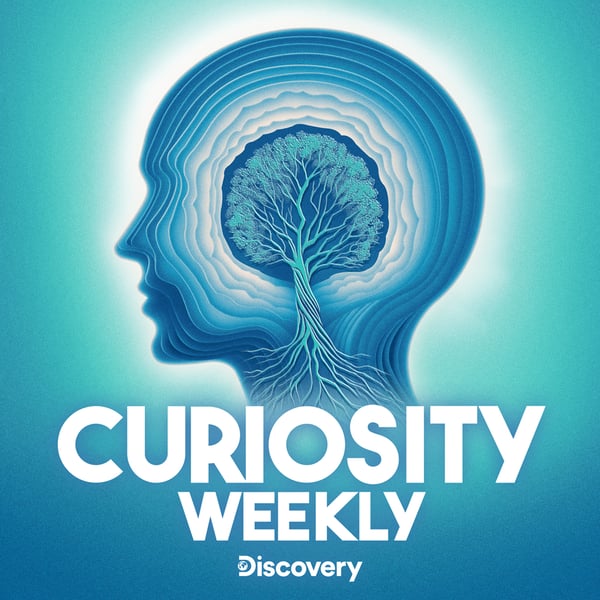Stanford Technique for Picking Creative Ideas, Why Whales Are So Big (But Not Bigger), and the First Medical Diagnosis and Treatment in Space from Earth
Curiosity Weekly
Warner Bros. Discovery
4.6 • 935 Ratings
🗓️ 10 February 2020
⏱️ 10 minutes
🧾️ Download transcript
Summary
Learn about how doctors on Earth diagnosed and treated an astronaut’s medical problem in space for the first time; a new study that explains why whales are so big, but not bigger; and a Stanford technique for getting better at picking creative ideas.
The First Medical Diagnosis and Treatment in Space from Earth by Mae Rice
- First reported occurrence and treatment of spaceflight medical risk 200+ miles above Earth. (2020). EurekAlert! https://www.eurekalert.org/pub_releases/2020-01/lsuh-1ro010220.php
- The Human Body in Space. (2011). NASA. https://www.nasa.gov/hrp/bodyinspace
- Venous Thrombosis during Spaceflight | NEJM. (2020). New England Journal of Medicine. https://doi.org/10.1056/NEJMc1905875
- How Long Does it Take to Get to Mars? (2013, May 9). Universe Today. https://www.universetoday.com/14841/how-long-does-it-take-to-get-to-mars/
- Rivard, A. B., & Bracken Burns. (2018, December 6). Anatomy, Head and Neck, Internal Jugular Vein. Nih.Gov; StatPearls Publishing. https://www.ncbi.nlm.nih.gov/books/NBK513258/
Why Whales Are So Big (But Not Bigger) by Steffie Drucker
- Learn, J. (2019, December 16). New Research Reveals Why Whales Evolved to be so Big. Discover Magazine. https://www.discovermagazine.com/planet-earth/new-research-reveals-why-whales-evolved-to-be-so-big-isns
- Goldbogen, J. A., Cade, D. E., Wisniewska, D. M., Potvin, J., Segre, P. S., Savoca, M. S., Hazen, E. L., Czapanskiy, M. F., Kahane-Rapport, S. R., DeRuiter, S. L., Gero, S., Tønnesen, P., Gough, W. T., Hanson, M. B., Holt, M. M., Jensen, F. H., Simon, M., Stimpert, A. K., Arranz, P., … Pyenson, N. D. (2019). Why whales are big but not bigger: Physiological drivers and ecological limits in the age of ocean giants. Science, 366(6471), 1367–1372. https://doi.org/10.1126/science.aax9044
- Whale Classification of Whales Baleen Whales Toothed Whales. (2020). Whaleroute.Com. https://www.whaleroute.com/class/index.htm
- Black, R. (2014, April 22). Whales vs. Dinosaurs: What’s the Biggest Animal of All Time? Slate Magazine; Slate. https://slate.com/technology/2014/04/whales-or-dinosaurs-what-are-the-biggest-heaviest-longest-animals-ever.html
- Blue whales can eat half a million calories in a single mouthful. (2010, December 9). Nationalgeographic.com. https://www.nationalgeographic.com/science/phenomena/2010/12/09/blue-whales-can-eat-half-a-million-calories-in-a-single-mouthful/
- Learn, J. (2019, December 16). New Research Reveals Why Whales Evolved to be so Big. Discover Magazine. https://www.discovermagazine.com/planet-earth/new-research-reveals-why-whales-evolved-to-be-so-big-isns
- Williams, T. M. (2019). The biology of big. Science, 366(6471), 1316–1317. https://doi.org/10.1126/science.aba1128
Stanford Technique for Picking Creative Ideas by Steffie Drucker
- Stanford. (2019, December 13). How you can get better at picking creative ideas. Futurity. https://www.futurity.org/creativity-creative-ideas-2232732/
- Berg, J. M. (2019). When silver is gold: Forecasting the potential creativity of initial ideas. Organizational Behavior and Human Decision Processes, 154, 96–117. https://doi.org/10.1016/j.obhdp.2019.08.004
Subscribe to Curiosity Daily to learn something new every day with Cody Gough and Ashley Hamer. You can also listen to our podcast as part of your Alexa Flash Briefing; Amazon smart speakers users, click/tap “enable” here: https://www.amazon.com/Curiosity-com-Curiosity-Daily-from/dp/B07CP17DJY
Find episode transcript here: https://curiosity-daily-4e53644e.simplecast.com/episodes/stanford-technique-for-picking-creative-ideas-why-whales-are-so-big-but-not-bigger-and-the-first-medical-diagnosis-and-treatment-in-space-from-earth
Hosted on Acast. See acast.com/privacy for more information.
Transcript
Click on a timestamp to play from that location
| 0:00.0 | Hi, you're about to get smarter in just a few minutes with Curiosity Daily from Curiosity.com. |
| 0:05.8 | I'm Cody Guff. And I'm Ashley Hamer. |
| 0:07.8 | Today you learn about how doctors on Earth diagnosed and |
| 0:15.0 | Stanford's medical problem in space for the first time, |
| 0:14.0 | a new study that explains why whales are so big, but not bigger, |
| 0:18.0 | and Stanford research that uncovered |
| 0:20.0 | how you can get better at picking creative ideas. |
| 0:22.0 | Let's satisfy some curiosity. how you can get better at picking creative ideas. |
| 0:22.5 | Let's satisfy some curiosity. |
| 0:24.9 | In space, no one can hear you scream, let alone cough. |
| 0:30.0 | But that doesn't mean astronauts can't get medical care. |
| 0:33.2 | Recently, doctors diagnosed and treated an astronaut in space, |
| 0:37.0 | from Earth, for the first time. |
| 0:39.7 | This only happened because the astronaut was lucky enough to be a participant in a medical study about space travel's effects on circulation. |
| 0:47.0 | Specifically, the researchers behind the study wanted to know how microgravity would affect the internal jugular vein. That sends blood from the |
| 0:54.7 | brain to the heart, so it's pretty important. In space though, blood tends to float |
| 1:00.1 | up towards an astronaut's head. How does this affect the jugular? To find out, the |
| 1:05.0 | researchers studied 11 astronauts on a multi-month mission on the International Space Station. |
| 1:09.6 | At set intervals throughout the trip, the astronauts ran |
| 1:13.2 | ultrasound on themselves, which let doctors back on Earth |
| 1:16.1 | track their vein health in real time. |
| 1:18.8 | Two months into the mission, one astronaut's ultrasound revealed a blood clot in the jugular vein. |
... |
Please login to see the full transcript.
Disclaimer: The podcast and artwork embedded on this page are from Warner Bros. Discovery, and are the property of its owner and not affiliated with or endorsed by Tapesearch.
Generated transcripts are the property of Warner Bros. Discovery and are distributed freely under the Fair Use doctrine. Transcripts generated by Tapesearch are not guaranteed to be accurate.
Copyright © Tapesearch 2025.

